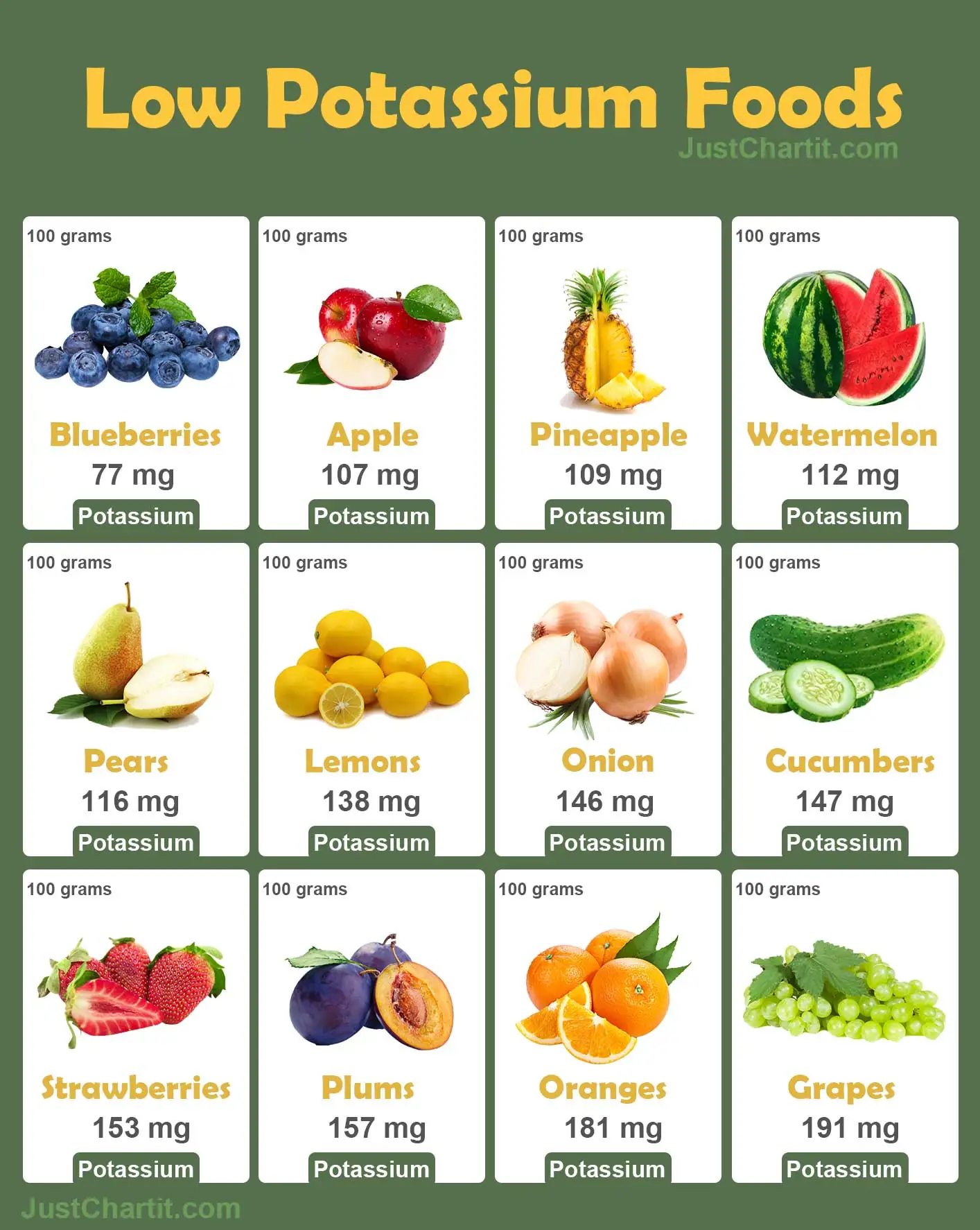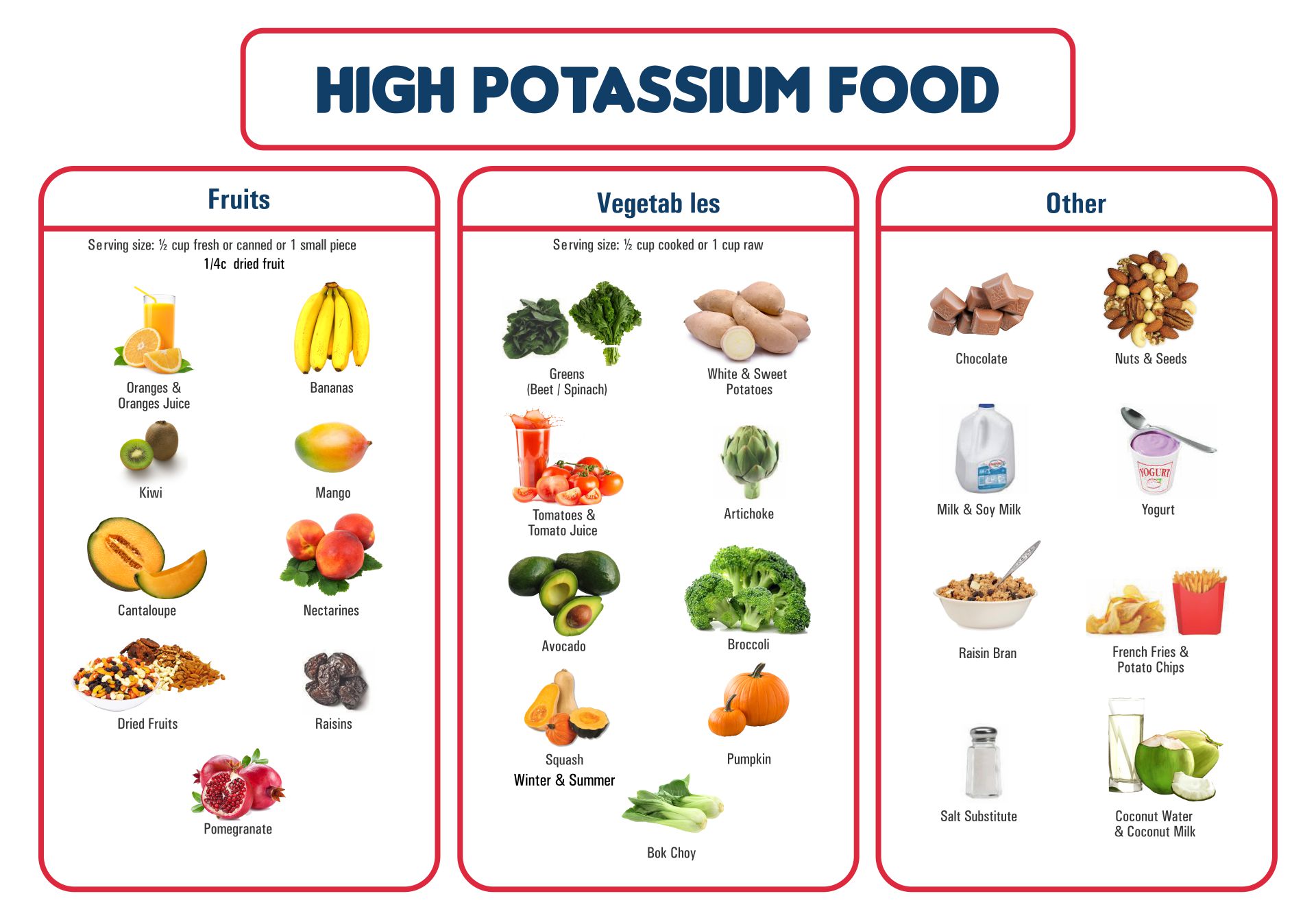Potassium is an important mineral that plays a vital role in maintaining good health. It is required for the proper functioning of various body systems, including the heart, muscles, and nerves. In addition, potassium helps regulate blood pressure, balance fluids, and support cellular function. It is therefore crucial to ensure that we consume an adequate amount of potassium-rich foods in our diet.
Potassium Rich Foods Chart
 A potassium-rich foods chart can be a useful tool in identifying the best food sources of this essential mineral. It can help you make informed choices about the foods you consume and ensure that you are meeting your recommended daily potassium intake.
A potassium-rich foods chart can be a useful tool in identifying the best food sources of this essential mineral. It can help you make informed choices about the foods you consume and ensure that you are meeting your recommended daily potassium intake.
Low Potassium Foods Chart
 On the flip side, a low potassium foods chart can be beneficial for individuals who need to limit their potassium intake due to medical conditions such as kidney disease or certain medications. This chart can help you identify foods that are lower in potassium and can be included in a restricted potassium diet.
On the flip side, a low potassium foods chart can be beneficial for individuals who need to limit their potassium intake due to medical conditions such as kidney disease or certain medications. This chart can help you identify foods that are lower in potassium and can be included in a restricted potassium diet.
High Potassium Food List
 For those aiming to increase their potassium intake, a high potassium food list can provide guidance on foods that are naturally rich in this mineral. Some examples of high potassium foods include bananas, avocados, spinach, potatoes, and yogurt.
For those aiming to increase their potassium intake, a high potassium food list can provide guidance on foods that are naturally rich in this mineral. Some examples of high potassium foods include bananas, avocados, spinach, potatoes, and yogurt.
It’s important to note that an appropriate potassium intake may vary depending on personal health factors. It is always advisable to consult with a healthcare professional or a registered dietitian before making any significant changes to your diet.
Benefits of Potassium
 Consuming an adequate amount of potassium can provide numerous benefits to your overall health. Here are some key benefits of including potassium-rich foods in your diet:
Consuming an adequate amount of potassium can provide numerous benefits to your overall health. Here are some key benefits of including potassium-rich foods in your diet:
- Regulates Blood Pressure: Potassium helps lower blood pressure levels by counteracting the effects of sodium.
- Supports Heart Health: Adequate potassium intake is associated with a lower risk of heart disease and stroke.
- Aids Muscle Function: Potassium plays a crucial role in muscle contraction, making it essential for athletes and physically active individuals.
- Promotes Bone Health: Potassium can help reduce the risk of osteoporosis and improve bone density.
- Enhances Nervous System Function: Potassium supports the transmission of nerve impulses, helping maintain proper brain function.
- Regulates Fluid Balance: Adequate potassium intake helps balance fluids in the body, preventing dehydration and maintaining healthy kidney function.
As you can see, potassium is a vital nutrient that plays a crucial role in overall health and well-being. Including potassium-rich foods in your diet can contribute to the maintenance of a healthy body and help prevent various health conditions.
It’s important to note that while potassium is generally safe to consume from food sources, excessive intake through supplements or medications can be harmful to individuals with certain medical conditions or those taking specific medications. Therefore, it’s always best to consult with a healthcare professional for personalized guidance on your potassium intake.
In conclusion, a potassium-rich diet is essential for promoting optimal health. Whether you are looking to increase or decrease your potassium intake, charts and lists can be helpful resources. Remember to focus on a balanced diet that includes a variety of fruits, vegetables, whole grains, and lean proteins to meet your overall nutritional needs. Prioritize your health and well-being by incorporating potassium-rich foods into your daily meals and snacks.